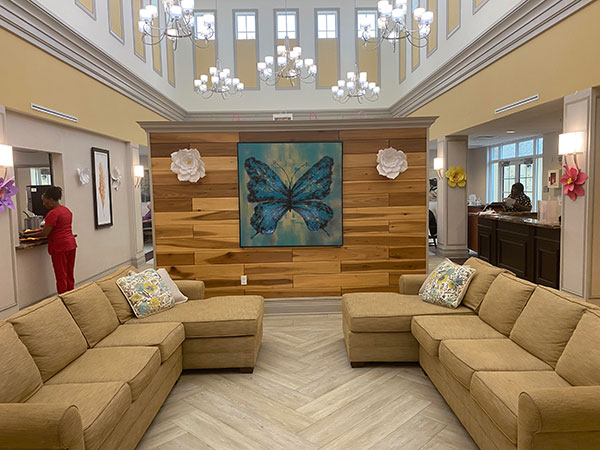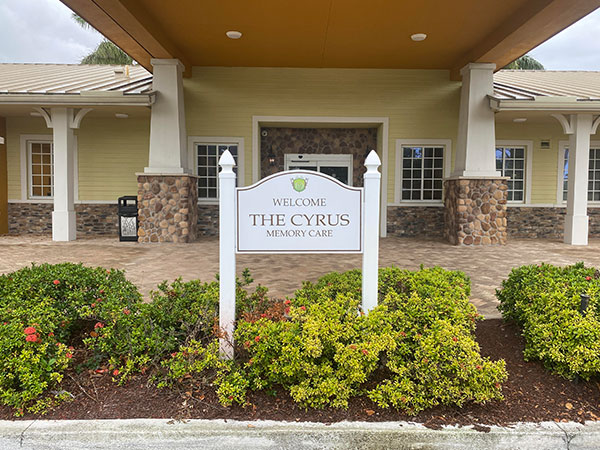Recognizing Alzheimer’s Symptoms and When it is Time to Seek Assisted Living
May 1, 2024
Nearly seven million Americans are living with Alzheimer’s, and by 2050, this number is projected to rise to almost thirteen million. Over eleven million Americans provide unpaid care for people with Alzheimer’s or other dementias. Seventy percent of dementia caregivers say that coordinating care is stressful. Two-thirds also have difficulty finding resources and support for their needs. Seventy-four percent of dementia caregivers say that they are concerned about maintaining their own health since becoming a caregiver.
The challenges of Alzheimer’s are legion. Not just for the patient enduring the continuing loss of mental and physical capacity but for the caregiver as well. The overwhelming and constantly growing stress of caring for a loved one eventually takes its toll on their own health and well-being. Given the gravity of Alzheimer’s and the toll it extracts from everyone involved, it’s important to recognize the stages of its development and when it’s time to engage professional help and treatment through assisted living.
Alzheimer’s Stages: How the Disease Progresses
- Preclinical Alzheimer’s disease.
- Mild cognitive impairment due to Alzheimer’s disease.
- Early Stage or mild dementia due to Alzheimer’s disease.
- Middle Stage or moderate dementia due to Alzheimer’s disease.
- Late Stage or severe dementia due to Alzheimer’s disease.
Alzheimer’s disease tends to develop slowly and gradually worsens over several years. Eventually, Alzheimer’s disease affects most areas of the brain.
Memory, thinking, judgment, language, problem-solving, personality, and movement can all be affected by the disease.

Note that Alzheimer’s affects people in diverse ways and that each person may progress through the stages at a different rate. It may also be difficult to place a person with Alzheimer’s in a specific stage as stages may overlap.
Major characteristics of each stage are discussed below.
Preclinical Alzheimer’s disease:
This stage of Alzheimer’s can last for years, even decades. Although no behavioral changes can be observed, new imaging technologies of the brain and sophisticated blood tests can identify the hallmarks of Alzheimer’s disease.
Mild cognitive impairment due to Alzheimer’s disease:
People with mild cognitive impairment experience minor changes in their memory and thinking ability, which are not significant enough to affect work or relationships. They may have memory lapses when it comes to information that is usually easily remembered, such as conversations, recent events, or appointments.
They may also have trouble judging the amount of time needed for a task, or the number or order of steps needed to complete it. Making sound decisions may become more difficult.

Early Stage or mild dementia due to Alzheimer’s disease:
Alzheimer’s disease is often diagnosed in the mild dementia stage. This is when it becomes clear to family and doctors that a person is having significant trouble with memory and thinking, and symptoms begin to impact their daily functioning.
Among the onset signs of Alzheimer’s in its early stage are…
- Trouble with problem-solving and complex tasks
- Memory loss of recent events
- Difficulty remembering newly learned information
- Asking the same question over and over
- Lapses in sound judgment
- Difficulty planning a family event or balancing a checkbook
- Changes in personality, becoming subdued or withdrawn, especially in socially challenging situations
- Atypical irritability or anger
- Reduced motivation to complete tasks
- Trouble organizing and expressing thoughts
- Trouble clearly expressing ideas
- Getting lost, even in familiar places
- Misplacing belongings
Middle Stage or moderate dementia due to Alzheimer’s disease:
During the moderate dementia stage of Alzheimer’s disease, people grow more confused and forgetful. They begin to need additional help with daily activities and self-care. People with the moderate dementia stage of Alzheimer’s disease may…
- Suffer increased memory loss
- Forget details of their personal history, such as their address, phone number or schools attended
- Repeat favorite stories or make them up to fill gaps in memory
- Show increasingly poor judgment
- Exhibit more severe confusion
- Lose track of where they are, the day of the week or the season
- Confuse family members or close friends with one another
- Mistake strangers for family
- Wander about looking for places that feel more familiar
- Require assistance with some daily activities
- Need help choosing proper clothes for occasions or weather
- May now need assistance with bathing, grooming, using the bathroom and other self-care
- May, on occasion, lose control of bladder or bowels
- Undergo significant changes in personality and behavior
- Develop unfounded suspicions
- Even see or hear things that are not actually there
- Grow restless or agitated, especially late in the day
- Exhibit outbursts of aggressive physical behavior
Late-Stage or severe dementia due to Alzheimer’s disease:
In the late stage of the disease, severe dementia due to Alzheimer’s, mental function continues to decline. Alzheimer’s also has an increasing impact on movement and physical capabilities.
In late-stage severe dementia due to Alzheimer’s disease, people generally:
- Lose the ability to communicate
- Can no longer converse or speak in ways that make sense
- Experience a serious decline in physical abilities
- Require total assistance with eating, dressing, using the bathroom and all other daily self-care tasks
- Lose their motor skills
- Experience rigid muscles and abnormal reflexes
- Become unable to control their bowels and bladder
- Become unable to swallow
Prognosis:
The rate of progression for Alzheimer’s disease varies widely. On average, people with Alzheimer’s disease live between 3 and 11 years after diagnosis. But some live 20 years or more.
The degree of impairment at diagnosis can affect life expectancy. For instance, untreated vascular risk factors such as hypertension are associated with a faster rate of progression of Alzheimer’s disease.
When is the right time to seek assisted living?
Patient Considerations:
If someone with dementia has severe symptoms that put their health and safety at risk, an assisted living community may be necessary.
Signs that it is time to seriously consider moving a loved one to an assisted living community include:
- Noticeable changes in the person’s behavior that are causing concern
- Frequent confusion or disorientation, which poses a risk to their physical safety
- Decline in physical health that requires more care than can be provided at home
- If the person is struggling with incontinence
- If the person is challenged by phone communication and the use of other electronic devices
- Hygiene issues, which may include not bathing or a decline in grooming or personal care
- Leaving appliances, like a stove, on unattended
- Forgetting to take medications
- Refusal to seek medical help for significant health issues
- Forgetting to eat or drink
- Inability to dress themselves properly or wear clothing appropriate for the weather
- Inability to keep up with everyday tasks, such as housekeeping
- Wandering or getting lost
Additionally, if someone with dementia is feeling isolated, assisted living may provide a more social and comfortable setting for them, with regular structure and interactions with staff or other residents.
Caregiver Considerations:
As part of the decision-making process, it is also important to consider the primary caregiver’s needs. It may be time to consider assisted living if a caregiver can no longer cope with the demands or feels exhausted, resentful, or consistently stressed by the necessary level of care required.
Assisted Living:
There are several types of residential assisted living communities with different price points, levels of assistance and number of amenities. Most offer housing, around-the-clock security and support, meals, medication, physical training, programs, activities, and hands-on care.
Those communities offering memory care help to improve the lives of those with Alzheimer’s and other forms of dementia, in addition to providing for all the patient’s other needs.
Some assisted living communities also offer temporary stay or respite care. This involves short-term stays by the patient at assisted living communities allowing needed time off for the caregiver.
For those seeking the ultimate care and life experience for themselves or their loved ones, there are also a number of luxury assisted living communities which offer high-end facilities and luxury amenities for independent senior living as well as assisted living and memory care.

Who makes the decision?
The National Institute on Aging recommends people talk with dementia patients and try to accommodate their preferences as much as possible. If a person with dementia cannot decide about their care themselves, it may fall to family members or caregivers. In either case, individuals with dementia will need to name a power of attorney for healthcare and finances. This allows the assigned person to make decisions on their behalf around medical care and financial issues.
Finally, it is important to note that what has been presented here are guidelines, and the decision should be made based on the individual’s specific circumstances and needs. Consulting with healthcare professionals can provide valuable guidance during this process, contact us today to learn more about Oakmonte Village of Davie and how we can help.
